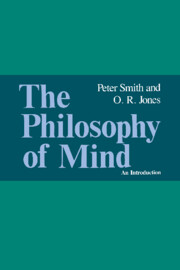Book contents
- Frontmatter
- Contents
- Preface
- Analytical Table of Contents
- PART I Dualism, For and Against
- I Introduction
- II Arguments for Dualism
- III Descartes's Argument
- IV Difficulties for the Dualist
- V Assessing the Dualist Theory
- PART II Towards a Better Theory of the Mind
- PART III Sensation, Thought and Freedom
- Chronological Table
- Guide to Further Reading
- Bibliography
- Index
IV - Difficulties for the Dualist
Published online by Cambridge University Press: 27 January 2010
- Frontmatter
- Contents
- Preface
- Analytical Table of Contents
- PART I Dualism, For and Against
- I Introduction
- II Arguments for Dualism
- III Descartes's Argument
- IV Difficulties for the Dualist
- V Assessing the Dualist Theory
- PART II Towards a Better Theory of the Mind
- PART III Sensation, Thought and Freedom
- Chronological Table
- Guide to Further Reading
- Bibliography
- Index
Summary
In the last two chapters we have seen that a number of initially attractive pro-dualist arguments fail to establish the existence of Cartesian Minds as entities distinct from our bodies. But it can't be emphasised too strongly that this is not yet to show that dualism is actually false. It is a simple but fundamental point of logic that bad arguments can have conclusions which happen to be true; knocking down even eight or nine arguments for a theory doesn't prove that the theory is wrong – for that still leaves open the possibility that a tenth argument will turn up trumps and conclusively demonstrate the soundness of the theory in question.
We now turn, however, to the anti-dualist case, and we will consider in this chapter a number of arguments that are designed to show that dualism is indeed a mistaken theory of the mind. But before doing so, it is perhaps worth stressing once more that the issue here is an issue about a particular theory concerning what it is to have a mind in the ordinary sense. To argue that this theory is a bad one isn't to suggest that we are really mindless zombies. On the contrary, in debating whether Cartesian Minds really exist, we will still be taking it for granted that we do have the capacities for thought and feeling: our question is about what makes it possible for us to have them.
The obvious place to begin our discussions is with the dualist's conception of the soul or self or mind as an immaterial entity distinct from (and in principle separable from) the body.
Information
- Type
- Chapter
- Information
- The Philosophy of MindAn Introduction, pp. 45 - 61Publisher: Cambridge University PressPrint publication year: 1986
